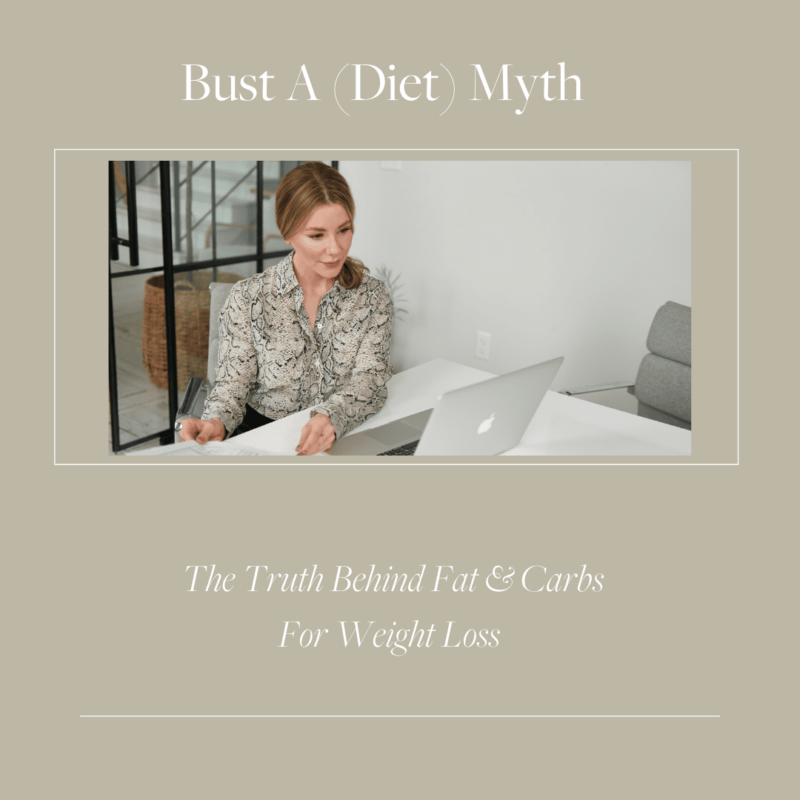
Bust a Myth: The Truth Behind Fat and Carbs for Weight Loss
There is still so much confusion around dietary intake of carbohydrates and fats and their effect on weight loss and metabolic health, and it’s a topic I love to help educate on as understanding these different macronutrients can make a huge impact on our health. Helping people break free of carb confusion and fear of fat is one of the reasons why I created my Lean & Clean Program for Metabolic Health, and I’ve outlined the science for you below.
All Calories Are Not Created Equal
Fat is bad, carbs are good fits into the paradigm that all calories are created equally, and that eating less calories than we expend puts us into a caloric deficit and we will lose weight. 1 gram of fat is equal to 9 calories, whereas 1 gram of carbohydrates is equal to 4 calories. Whilst energy intake and output does have an impact on weight loss and our metabolic health, it’s not as simple as calories in, calories out, as explained below.
Additionally, high carb, low fat diets have been touted as the answer to our weight loss woes since the 1960’s, in part due to government agriculture policy weighing in on nutrition advice and promoting the intake of grain based foods such as bread and pasta (see Mark Hyman’s book ‘Food Fix for more information on this) and in part due to bad science that wrongly promoted high carb, low fat diets and made its way into the public consciousness.
Over 60 years later, in no small part due to these diets we currently have the highest ever levels of metabolic diseases such as Insulin Resistance, Type 2 Diabetes and CVD. But why is this, and why do I, along with many other Functional Nutritionists and Doctors promote a low carb diet such as my Lean & Clean Program? Find out below…
On a base level, food is fuel to the body. But (just as importantly), food also provides information to the body, and the different macronutrients (fat, protein, carbohydrates) trigger different hormonal responses which create specific outcomes.
Food is Information
Hormones literally run the show in our bodies, and are responsible for so much more than just our menstrual cycles. When we consume fat a wildly different hormonal response occurs compared to when we consume carbohydrates, and it is this response that helps us understand why high carb diets can be more fattening and damaging to our metabolic health than diets that are higher in protein and fats.
When we consume any food, it is broken down into its component parts during digestion and released into the bloodstream. Protein breaks down into amino acids, carbs break down into glucose, and fats into fatty acids.
When high amounts of glucose are detected in the bloodstream, our pancreas releases a hormone called insulin. Insulin’s role is to help the glucose get into our muscle cells where it can be used as fuel. If the muscle cells are full (this is typically the case in diets that are high in carbs and for those that live sedentary lifestyles) then the excess glucose is stored in our fat cells. Think of insulin as your ‘storage hormone’.
Diets that are too high in carbohydrates can lead to a condition called Insulin Resistance, which can mean that your cells are unable to take up the glucose that is circulating in your bloodstream. In response your pancreas makes even more insulin, but if the situation continues your pancreas is unable to keep up, and blood sugar will stay high, which can cause even more damage in the body.
Additionally, high insulin can result in leptin resistance – leptin is a hormone produced by our fat cells that tell the brain that there is enough body fat in storage for us to be safe and healthy (a healthy amount of body fat is essential to our survival, but too much is damaging to our health).
Is Fat Still the Enemy for Weight Loss?
But what about fat? Fatty acids do not result in a release of insulin, so do not tell the body to go into ‘storage mode’. But the hormones that they do release are actually beneficial to weight loss and metabolic health, as these hormones send signals to the brain that make us feel full and satisfied. For example, fatty acids promotes the release of Cholecystokinin, the ‘Satiety’ Hormone which can slow down gastric emptying and keep you feeling full for longer and minimizes secretion of Neuropeptide Y, the ‘Stimulate’ Hormone which stimulates our appetite for sugar and carbohydrates.
One of the key principles behind my Lean & Clean Program and the Lean & Clean Food Formula is minimizing the secretion of insulin, and increasing the secretion of the hormones that make us feel full and satiated. I’m running the only group challenge of the year starting May 24th to have you feeling lean, toned, strong and confident in time for the summer. Enroll below and you will automatically be enrolled in this exclusive challenge:
Get in shape for the summer with my Lean & Clean Program for healthy weight loss.
Helping
High-Achieving
Women Create
Optimum
Health
home
about
private coaching
The Metabolic Beauty Reset
corporate wellness
blog
privacy policy
terms & conditions
contact
© 2021 Jennifer Hanway, llc | All Rights Reserved | brand + website by high Moon studio
Programs